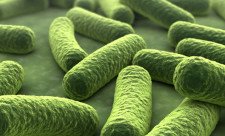
An estimated one half of the global population harbours Helicobacter pylori, a bacterium linked to the development of gastric ulcers, gastritis, and other diseases of the stomach. Symptoms for acute Helicobacter infections are vomiting, belching, bloating, or nausea as well as frequently recurring stomach pain or abdominal pain.
What should you do if you have abdominal pain? Should it return regularly, have yourself examined for Helicobacter infection. Options are a simple breath test or during a gastroscopy (panendoscopy).
To keep existing Helicobacter pylori colonisation in check and prevent or treat inflammation of the stomach lining or even gastric ulcers, a good bacterium (probiotic) may help. ORGANOBALANCE, a biotechnology company, has identified among its collection of some 8,000 microorganisms a Lactobacillus strain which fulfils precisely this role. A unique mechanism of action lets it bind Helicobacter pylori which is then flushed from the stomach and finally excreted. Contrary to conventional therapies using antibiotics, only the Helicobacter bacterium is attacked without affecting the other natural stomach and gut flora.
See more at: https://www.gesunde-bakterien.de/milchsaeurebakterien-gegen-helicobacter-pylori/#sthash.SqPnwElv.dpuf
Mode of action:
Dieser Post ist auch verfügbar auf: German

 14. Oct 2014
14. Oct 2014 Popular
Popular Recent
Recent Comments
Comments












